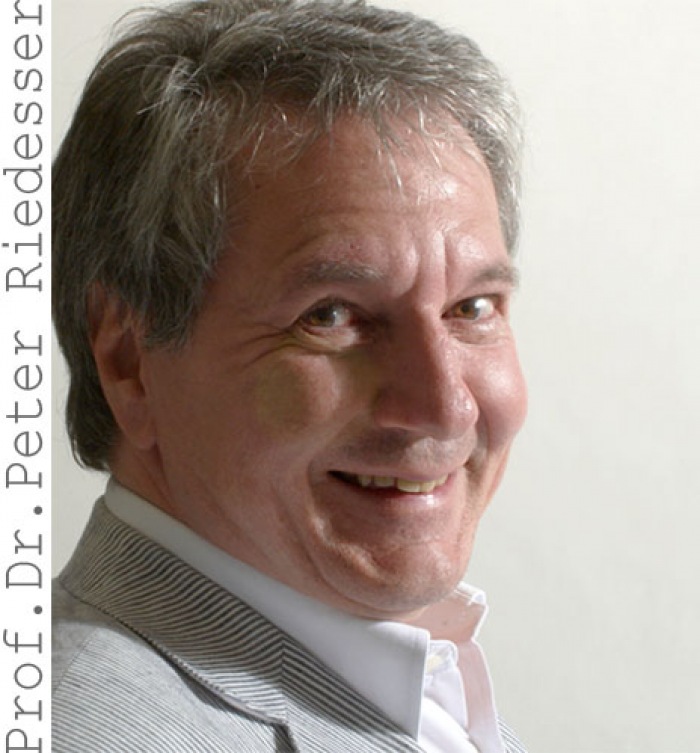Giordano Bruno Stiftung Mourns the Death of its Adviser Prof. Dr. Peter Riedesser

0094___peter_riedesser.jpg
Photo: Evelin Frerk
Peter Riedesser is dead. The director of the Clinic for Child and Adolescent Psychiatry at the University Hospital Hamburg-Eppendorf died on early Friday morning (September 19, 2008) at the age of 63 from the consequences of an aggressive cancer disease. In his eulogy, Michael Schmidt-Salomon remembers a great freethinker and humanist who gave important impulses (not only) to the Giordano Bruno Stiftung:
There are people who you can't even imagine dying. Peter Riedesser was one of those people. Peter was one of the most vital persons I met in my life. He was bursting with ideas. In three minutes he was able to produce more project proposals than a whole team of PR consultants in three days. It would have taken three dozen Giordano Bruno Stiftungs to implement all the wild, clever, witty ideas that Peter brought forth.
He was anything but a dreamer with his heads in the clouds. Everything Peter did was substantiated. He plunged into his projects with great passion, but never headless. As relaxed as he seemed, he took his work immensely serious. In order to use his time as efficiently as possible, he hired a personal "time manager" to help him coordinate the numerous projects in which he was involved. Even when he knew he was about to die he remained active. Just a few days before his death he sent me a note about a new publication which he thought I could use for my current book project. "I can sleep when I'm dead," he told me once. Obviously, he followed that maxim to the end.
Peter Riedesser was a person who not only had the ability to be enthusiastic about new ideas, but also to infect others with his enthusiasm. For example, he encouraged tennis icon Steffi Graf to set up the "Children for Tomorrow" foundation, which supports war-traumatized children all over the world. Together with the former tennis star and many other supporters, he launched projects to help underage war victims in Hamburg, Southeast Europe, Africa, and the Middle East, and brought together the world's leading traumatologists to look for ways to improve the lives of children who have lived through dreadful experiences. In addition, he made time to actively participate in the boards of the "German Society for Child and Youth Psychiatry" and the International Physicians for the Prevention of Nuclear War (IPPNW).
Peter's publications were always controversial. In the 1980s, together with Axel Verderber, he took German military psychiatry to account. The books "Aufrüstung der Seelen" ("Armament of the Souls") and "Maschinengewehre hinter der Front" ("Machine Guns Behind the Front") caused "a violent scandal", according to "Die Zeit" in a noteworthy feature about the "soul organizer" Riedesser. Tilman Moser correctly described the standard work "Lehrbuch der Psychotraumatologie" ("Textbook of Psychotraumatology"), published in 1998 together with Gottfried Fischer, as a "head start for the foundation of a new subject".
In recent years, Peter worked with Axel Verderber on a new book that he hoped would have a broad impact. The book was intended to deal with a particularly taboo subject, namely the religious traumatization of children. How important this subject was for Peter is shown by the fact that he was on his deathbed, one day before his death, still discussing with his good friend and colleague Axel Verderber where he could find which sources and what he could perhaps take into account when writing the book.
The importance Peter attached to the topic of "religious traumatization" was partly autobiographical. Born in 1945 in a small village in Upper Swabia, he fell under the influence of a Catholic cleric who was determined to make him a priest. Fortunately, Peter was "merely religiously neurotized, not traumatized," as he later said. He cured himself by reading Schopenhauer and Nietzsche. After beginning his studies in the humanities, he followed his role model Albert Schweitzer and studied medicine. In 1979 he took up employment as a child and youth psychiatrist at the University Children's Hospital in Freiburg. In 1991 he followed an invitation to Hamburg, where he took up the post of director of the Clinic for Child and Adolescent Psychiatry. Not long before he was diagnosed with pancreatic cancer, he was at the zenith of his creativity, as he said back then. He achieved a lot, but had much more ahead of him. However, the illness disrupted his plans.
A story that characterizes Peter very well happened during his time as an assistant doctor at the Freiburg Children's Hospital. There was an inbuilt chapel with a catholic consecrated altar, which was rarely used. Peter brought the very devout clinic director of the time so far that he finally, with a heavy heart, agreed to transform the chapel into a hospital kindergarten. A high dignitary of the Freiburg archbishopric had to "desecrate" the altar before it could be removed with a pneumatic hammer. In this way, the Freiburg Children's Hospital acquired a kindergarten with a beautiful modern stained glass window.
I can speak on behalf of the entire board of the Giordano Bruno Stiftung when I say that it has been a great honour and pleasure for each of us to work with such an extraordinary person like Peter Riedesser. We will miss his courage, his humour, his creativity, his knowledge, his energy, his friendliness. With him, we not only lose one of the most active advisers of our foundation, but also a good friend on whom we could rely one hundred percent, even if things got tough once in a while. Peter was a great source of inspiration for all of us. We will make every effort to continue what he begun...
Michael Schmidt-Salomon
